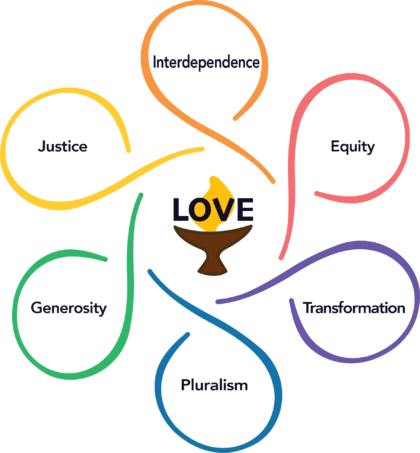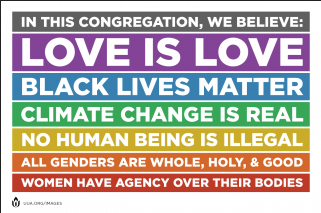What We Believe
In Unitarian Universalism, you can bring your whole self: your full identity, your questioning mind, your expansive heart. We are people of all ages, people of many backgrounds, and people of many beliefs. We are brave, curious and compassionate thinkers and doers. We create spirituality and community beyond boundaries, working for more justice and more love in our own lives and in the world.
Unitarian Universalism draws from our heritages of freedom, reason, hope, and courage, building on the foundation of love. We covenant, congregation-to-congregation and through our Association, to support and assist one another in our ministries.
Love is the power that holds us together and is at the center of our shared values. The values we share include all the following, which we hold as inseparable and deeply interconnected:

- Interdependence: We honor the interdependent web of all existence and acknowledge our place in it.
- Pluralism: We are all sacred beings, diverse in culture, experience, and theology.
- Justice: We work to be diverse multicultural Beloved Communities where all feel welcome and can thrive.
- Transformation: We adapt to the changing world.
- Generosity: We cultivate a spirit of gratitude and hope.
- Equity: We declare that every person is inherently worthy and has the right to flourish with dignity, love, and compassion.
Origins of Unitarian Universalism
Our faith gets its name from the merger in 1961 of two religious groups: The Unitarians and the Universalists. Today, across North America there are more than 1,000 UU congregations serving 250,000 people. You may find folks of many different religious backgrounds (Buddhists, Christians, Jews, Muslims, Hindus, and Pagans) You may find folks with different beliefs in God – from theists to agnostics, to atheists. You will find we embrace science and reason and see them as essential to a responsible spiritual life.
Read more about Unitarian Universalism:


